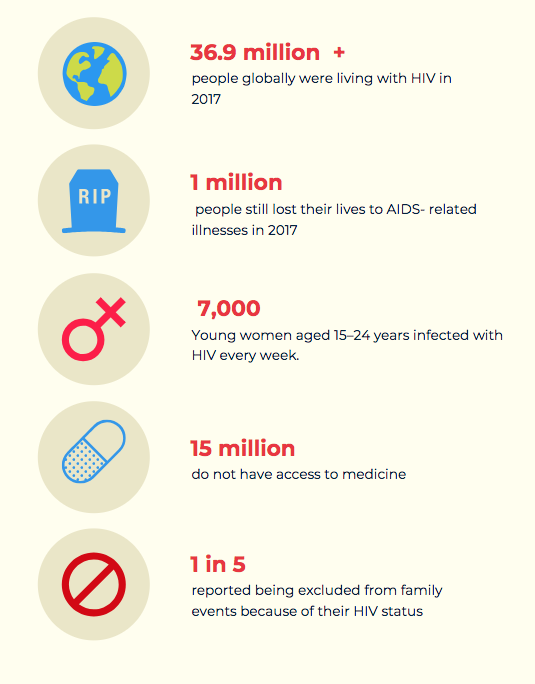
It’s been 30 years since the first World’s AIDS Day. Since then, there have been medical advancements and education available about AIDS and HIV that have changed its perception.
Before, HIV was to receive a death sentence.The medical world was mystified by a mysterious illness killing mostly gay men. Rock Hudson, Freddie Mercury, and rapper Eazy-E (who was straight) are just a few of the famous people that lost their battle to the deadly virus.
In honour of World AIDS Day, we will compare the progression of AIDS between now and back in the 1980s.
Medical Advancement

Data from Public Health England
Today, there are an abundance of treatments available to manage and prevent the virus. The treatment used are antiretrovirals (ARV) on a daily basis. These had been researched since 1983 but were introduced in 1996.
ARV does not kill the virus but stops it from continuing replicating in the body. The viral load is undetectable in people who take AVR regularly. This is referred to as a “U=U” affect.
20 million people now have access to ARV and AIDS related deaths have decreased by 51 per cent. These drugs are covered under the NHS. Public Health England reported 96% of people with HIV have access to antiretroviral therapy (ART) in 2016.
HIV activists are campaigning for more public research for new drugs as pharmaceutical companies are monopolising this sector. This allows the companies to charge high prices that the NHS cannot cover hence 15 million people do not have access to the medicines they need.
Awareness
There were a number of public awareness campaigns in the UK in the early days of the HIV epidemic. The campaigns were to caution people about how HIV is passed on and advising the general public to practice safe sex. Terry Madeley did an interviews in 1987, making him the first in the UK to speak openly about his fight with AIDS.
In recent years, there are few public HIV awareness campaigns. Mike Podmore, Director of STOPAIDS, believes this is due to the belief of AIDS no longer an issue because of the advancement. Podmore told Voice of London: ”There was a strong perception that maybe we can take are foot off the peddle a little bit and focus on other issue. There were many other competing issues such as climate change.”
This lack of awareness creates a lack of HIV knowledge in the UK. A 2014 National AIDS Trust found that only 45% of people could correctly identify all of the ways HIV is transmitted. The report found an increasing proportion of people believe in incorrect routes of transmission, like kissing. They also found there has also been less funding for HIV prevention in the UK and globally.
It can be easy to confuse HIV and AIDS. They are different diagnoses, but they do go hand-in-hand: HIV is a virus that can lead to a condition called AIDS. #WorldAIDSDay2018 #WAD30 #RPSAaware pic.twitter.com/U48ST39lXg
— RPSA/AEPHAR (@RPSARwanda) November 29, 2018
STOPAIDS, a UK agency, are running a week long festival in celebration of World AIDS day. “It was the first time of doing it for us,” said Podmore.“It was the 30th anniversary of the first World’s AIDS Day so we thought we really want to do something big that tries to unit the domestic and the international sector together and really engages the public, particularly young people.”
Every day this week @worldwidefm are hosting a #WorldAIDSDay special show from 10-11am for the #ENDAIDS2030 Festival!
This morning @Erica_Mckoy spoke to @HIV_Voices – listen here👉 https://t.co/HETxCSUjM0 pic.twitter.com/3jfTAA72Bg
— STOPAIDS (@STOPAIDS) November 28, 2018
“We were aware that people just didn’t know what was going on with the globally response to HIV and also what was going in the UK.”
The festival ran 45 events across the UK in London, Brighton, Cardiff, Sheffield, and Edinburgh.
Stigma and discrimination
This seems the one area that has not progressed over the years. The ‘UK Stigma Index 2015’ surveyed more than 1,500 people living with HIV in the UK and it found evidence that people in the UK still hold stigmatising attitudes towards with HIV.
Roughly one in five people reported being left out from family events and 20% reported sexual rejection after disclosing HIV status. A 2014 survey among black Africans living with the HIV showed that a third had been discriminated against because of their status. Half the responds reported experiencing discrimination from healthcare workers (including doctors, dentists and hospital staff).
Lloyd Russell-Moyle, Labour MP for Brighton Kemptown, became the first MP to reveal his HIV status in the House of Commons. He did this act to “those out there living with HIV, that their status does not define them.”
He added that “it is better to live in knowledge than to die in fear” for people who are fearful of getting tested.
Words: Earyel Bowleg | Subbing: Maria Campuzano
Photo credits: Andrew_Stevens_h (Flickr)

